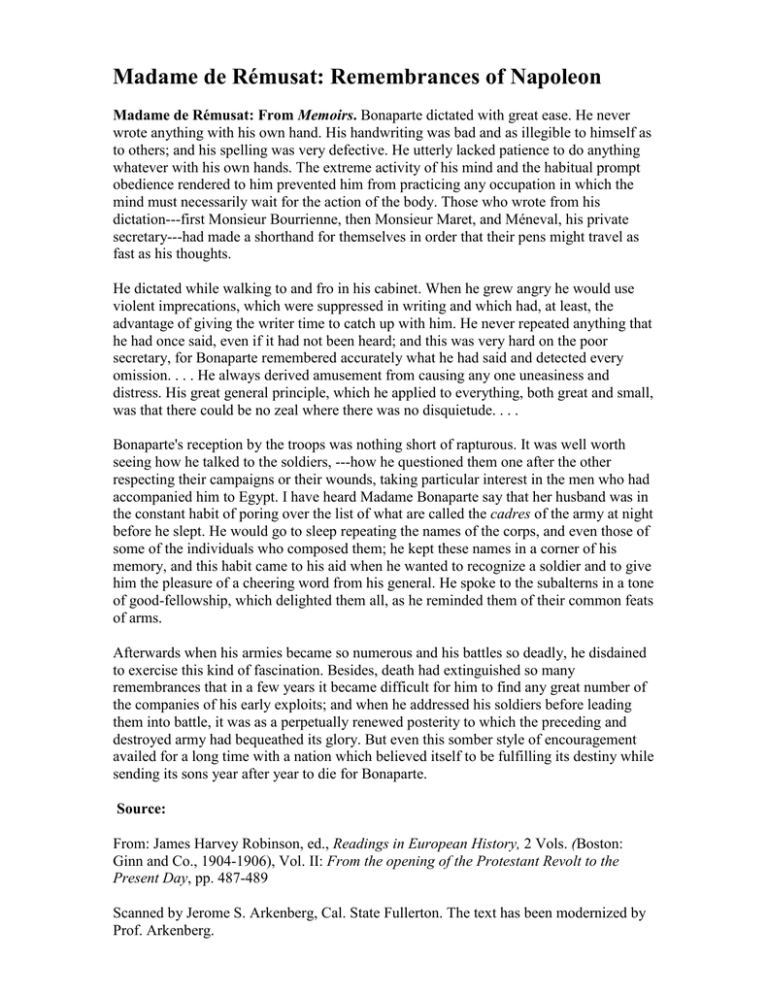Madame de Rémusat: Remembrances of Napoleon
advertisement

Madame de Rémusat: Remembrances of Napoleon Madame de Rémusat: From Memoirs. Bonaparte dictated with great ease. He never wrote anything with his own hand. His handwriting was bad and as illegible to himself as to others; and his spelling was very defective. He utterly lacked patience to do anything whatever with his own hands. The extreme activity of his mind and the habitual prompt obedience rendered to him prevented him from practicing any occupation in which the mind must necessarily wait for the action of the body. Those who wrote from his dictation---first Monsieur Bourrienne, then Monsieur Maret, and Méneval, his private secretary---had made a shorthand for themselves in order that their pens might travel as fast as his thoughts. He dictated while walking to and fro in his cabinet. When he grew angry he would use violent imprecations, which were suppressed in writing and which had, at least, the advantage of giving the writer time to catch up with him. He never repeated anything that he had once said, even if it had not been heard; and this was very hard on the poor secretary, for Bonaparte remembered accurately what he had said and detected every omission. . . . He always derived amusement from causing any one uneasiness and distress. His great general principle, which he applied to everything, both great and small, was that there could be no zeal where there was no disquietude. . . . Bonaparte's reception by the troops was nothing short of rapturous. It was well worth seeing how he talked to the soldiers, ---how he questioned them one after the other respecting their campaigns or their wounds, taking particular interest in the men who had accompanied him to Egypt. I have heard Madame Bonaparte say that her husband was in the constant habit of poring over the list of what are called the cadres of the army at night before he slept. He would go to sleep repeating the names of the corps, and even those of some of the individuals who composed them; he kept these names in a corner of his memory, and this habit came to his aid when he wanted to recognize a soldier and to give him the pleasure of a cheering word from his general. He spoke to the subalterns in a tone of good-fellowship, which delighted them all, as he reminded them of their common feats of arms. Afterwards when his armies became so numerous and his battles so deadly, he disdained to exercise this kind of fascination. Besides, death had extinguished so many remembrances that in a few years it became difficult for him to find any great number of the companies of his early exploits; and when he addressed his soldiers before leading them into battle, it was as a perpetually renewed posterity to which the preceding and destroyed army had bequeathed its glory. But even this somber style of encouragement availed for a long time with a nation which believed itself to be fulfilling its destiny while sending its sons year after year to die for Bonaparte. Source: From: James Harvey Robinson, ed., Readings in European History, 2 Vols. (Boston: Ginn and Co., 1904-1906), Vol. II: From the opening of the Protestant Revolt to the Present Day, pp. 487-489 Scanned by Jerome S. Arkenberg, Cal. State Fullerton. The text has been modernized by Prof. Arkenberg.



